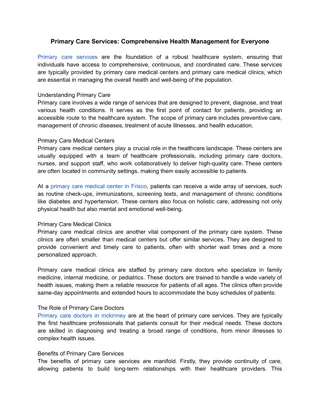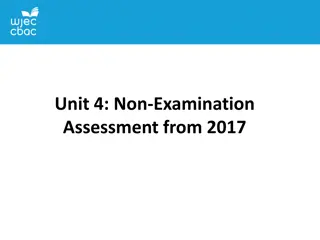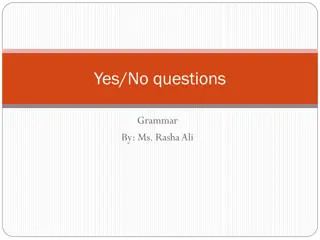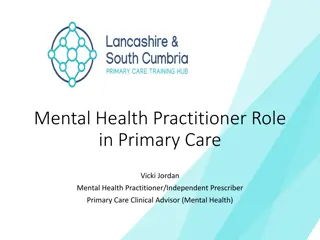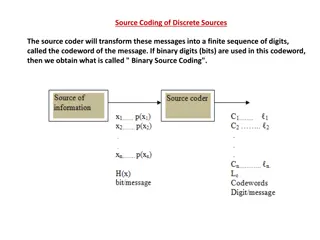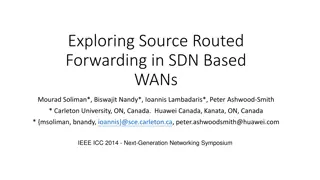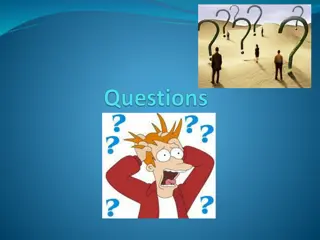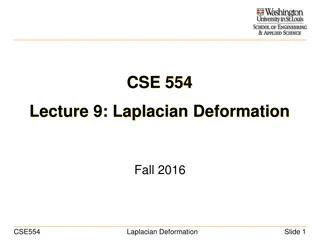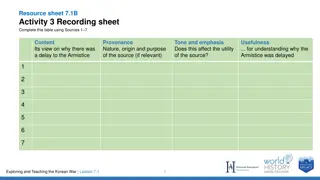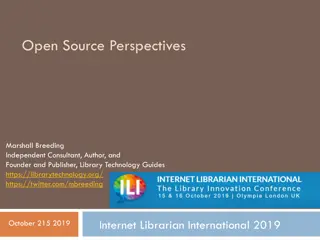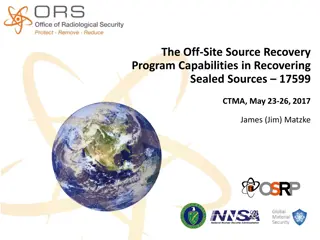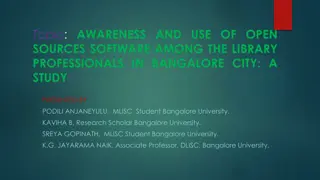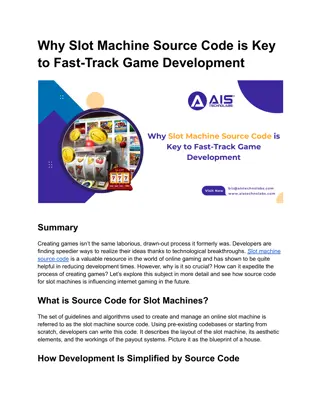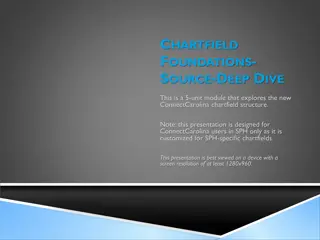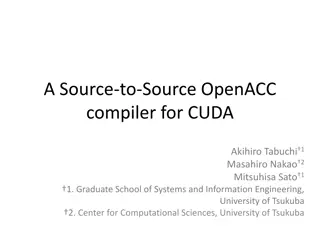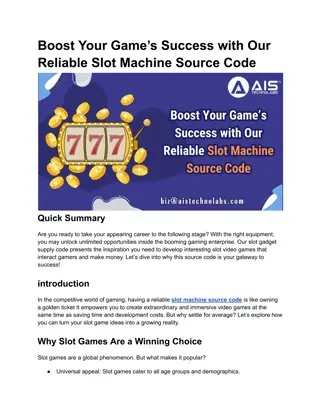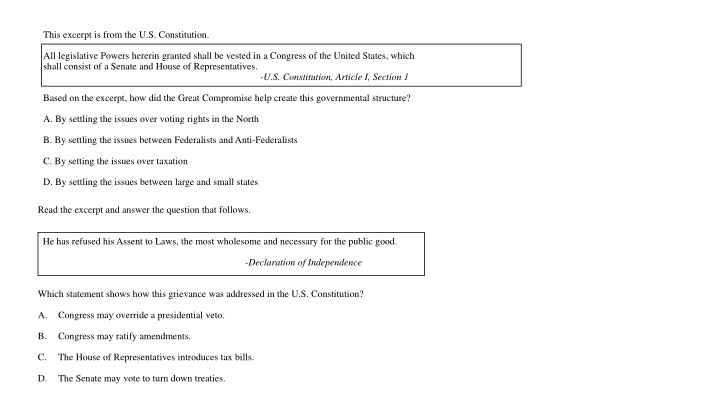
Governmental Structure and Founding Fathers' Ideals in U.S. History
Explore how the Great Compromise, Federalism, Freedom of Press, and Commerce Regulation shaped the U.S. government, as discussed in excerpts from the U.S. Constitution and writings of Founding Fathers.
Download Presentation

Please find below an Image/Link to download the presentation.
The content on the website is provided AS IS for your information and personal use only. It may not be sold, licensed, or shared on other websites without obtaining consent from the author. If you encounter any issues during the download, it is possible that the publisher has removed the file from their server.
You are allowed to download the files provided on this website for personal or commercial use, subject to the condition that they are used lawfully. All files are the property of their respective owners.
The content on the website is provided AS IS for your information and personal use only. It may not be sold, licensed, or shared on other websites without obtaining consent from the author.
E N D
Presentation Transcript
This excerpt is from the U.S. Constitution. All legislative Powers hererin granted shall be vested in a Congress of the United States, which shall consist of a Senate and House of Representatives. -U.S. Constitution, Article I, Section 1 Based on the excerpt, how did the Great Compromise help create this governmental structure? A. By settling the issues over voting rights in the North B. By settling the issues between Federalists and Anti-Federalists C. By setting the issues over taxation D. By settling the issues between large and small states Read the excerpt and answer the question that follows. He has refused his Assent to Laws, the most wholesome and necessary for the public good. -Declaration of Independence Which statement shows how this grievance was addressed in the U.S. Constitution? A. Congress may override a presidential veto. B. Congress may ratify amendments. C. The House of Representatives introduces tax bills. D. The Senate may vote to turn down treaties.
This question has two parts. This excerpt explains the system of federalism. In a single republic, all the power surrendered by the people is submitted to the administration of a single government.. ..In the [government separated into states] of America, the power surrendered by the people is first divided between two distinct governments, and then the portion allotted to each, subdivided among separate departments. Hence a double security arises to the rights of the people. The different governments will control each other, at the same time that each will be controlled by itself. -James Madison, Federalist, no. 51,1788 Part A Based on the excerpt, why did James Madison believe that federalism is needed in government? A. It allows the government to make decisions more efficiently. B. It limits governmental authority in order to avoid abuses of power. C. It prevents conflict over controversial governmental policies. D. It provides the government with a way to support the powers of the military. Part B Which idea expressed by Madison in the excerpt provides evidence to support the answer to Part A? A. People surrender their power to the government. B. A single government body is best. C. Local governments should have the most power. D. Power divided between governmental bodies protects the people.
This excerpt is from a letter written by a Founding Father. Our liberty depends on the freedom of the press, and that cannot be limited without being lost. -Thomas Jefferson, Letter to James Currie, January 28,1786 Why did Jefferson believe this freedom was significant? A. To prevent political parties from sharing information about opponents B. To allow governmental review of information prior to publication C. To allow different points of view to be shared with the public D. To prevent criticism of elected officials who pass laws This excerpt is from the U.S. Constitution. The Congress shall have Power To regulate Commerce with foreign Nations, and among the several States. -U.S. Constitution, Article I, Section 8, Clause 3 How did the U.S. Supreme Court interpret this article in Gibbons v. Ogden (1824)? Select TWO correct answers. States may control commerce within their borders that involves foreign countries. States may be subject to federal regulation in matters of commerce. States may possess the power to regulate interstate commerce. States may pass legislation that restricts interstate commerce. States may regulate within their own borders.
Read the excerpt and answer the question that follows. Whereas a convention, assembled in the State of South Carolina, have passed an ordinance, by which they declare that the several acts and part of the acts of the Congress of the United States ... are void, and no law, ....I Andrew Jackson, President of the United States, have thought proper to issue this PROCLAMATION, stating my views of the Constitution and laws applicable to the measures adopted by the Convention of South Carolina, and warn them of the consequences that must inevitably result.... -President Andrew Jackson, December 10, 1832 Which constitutional question was raised and debated because of the actions described in the excerpt? A. Can states nullify federal laws? B. Can the federal government take control of private property? C. Can states apply full faith and credit to other states? D. Can the federal government guarantee due process? This excerpt is from an essay published in 1849. I have paid no poll tax in years. I was put into a jail once on this account, for one night. -Henry David Thoreau, Civil Disobedience, 1849 How did Thoreau justify this act of civil disobedience? A. He disagreed with increasing taxes for the lower classes. B. He disapproved of increasing taxes to fund mainly urban areas. C. He objected to tax money being used to pay for the U.S.-Mexican War. D. He refused to provide tax money to a government that supported the Civil War.
This question has two parts. This excerpt describes a speech given by Frederick Douglas in 1841. I attended an anti-slavery convention at which it was my happiness to become acquainted with Frederick Douglass. I shall never forget his first speech at the convention the powerful impression it created .I think I never hated Slavery so intensely at that moment . He came forward to the platform with a hesitancy and embarrassment .After apologizing for his ignorance, and Reminding the audience that slavery was a poor school for the human intellect and heart, he proceeded to narrate some of the facts in his own history as a slave. -William Lloyd Garrison, from Narrative of the Life of Frederick Douglass, an American Slave by Frederick Douglass Part A Based on the excerpt, why was Frederick Douglass significant to the abolitionist movement? A. He was elected as a state government official who challenged the system of slavery. B. He formed relationships with those who had different views on slavery from his own. C. He described his own personal experiences under the system of slavery. D. He emphasized that an educational system was the main way to end slavery. Part B Which quotation from the excerpt provides evidence to support the answer to Part A? A. it was my happiness to become acquainted with Frederick Douglass B. I shall never forget his first speech at the convention C. He came forward to the platform with a hesitancy and embarrassment D. he proceeded to narrate some of the facts in his own history as a slave
This excerpt is from the Declaration of Sentiments in 1848. We hold these truths to be self-evident: that all men and women are created equal; that they are endowed by their Creator with certain inalienable rights .It is the right of those who suffer to insist upon the institution of a new government. -Declaration of Sentiments, 1848 Based on the excerpt and your knowledge of U.S. history, how did the Declaration of Sentiments affect U.S. History? A. It highlighted inequalities that existed in society and called for changes in the system of suffrage. B. It presented facts about the dangers of alcohol consumption and called for immediate prohibition. C. It highlighted reasons why slavery was unethical and called for enslaved people to be freed. D. It presented problems caused by a lack of education and called for children to attend school. This excerpt is from a poem from the 1850s. I CELEBRATE myself, and sing myself, And what I assume you shall assume, For every atom belonging to me as a good belongs to you. -Walt Whitman, Song for Myself, 1855 How does Whitman demonstrate the American way of life in the mid-1800s in this poem? A. He explains the civic responsibilities that all citizens have. B. He describes the individualism hat citizens highly valued. C. He provides an example of the ideas of the temperance movement. D. He puts into words the ideals shown in the Hudson River School of art.
Read the excerpt and answer the question that follows. In most of the States in which slavery is tolerated, the laws in relation to free [black] persons are severe in the extreme. Though their freedom is recognized, yet they have not the right of other freemen .At the North, few blacks are mechanics, because the whites will not allow them to work with them. At the South, on the contrary, few of the mechanics are whites, because they will not do the same sort of work as blacks. -William Lloyd Garrison, The Liberator, January 22, 1831 According to Garrison s observations, how were slaves and free blacks treated similarly in both the North and the South? A. Both slaves and free blacks could travel without restrictions. B. Both slaves and free blacks experienced discrimination. C. Both slaves and free blacks often owned businesses. D. Both saves and free blacks were not paid for their work. This excerpt if from a proposed constitution for the Kansas Territory that contributed to sectional conflict. Article VII. Slavery. Section 2. The Legislature shall have no power to pass laws for the emancipation of slaves without the consent of the owners, or without paying the owners previous to their emancipation a full equivalent in money for the slaves so emancipated. -Lecompton Constitution, 1857 Based on the excerpt, which group wrote the Lecompton Constitution? A. Opponents of westward expansion B. Supporters of abolitionism C. Anti-slavery Northerners D. Pro-slavery Southerners
These excerpts are from presidential inaugural addresses. The declared purpose of the compact Union was to establish justice, insure domestic tranquility, provide for the common defense, promote he general welfare, and secure the blessing of liberty to ourselves and our posterity; and when it ceased to answer the ends for which it was established, the government created by that compact should cease to exist As necessity, not a choice, we have resorted to the remedy of separation. -Jefferson Davis, first inaugural address, February 18, 1861 I hold, that our national Constitution, and Union will endure forever it being impossible to destroy it . No State can lawfully get out of the Union and acts of violence within any State or States, against the authority of the United States, are [rebellious] or revolutionary. -Abraham Lincoln, first inaugural address, March 4, 1861 Based on these excerpts, which statement describes the ideas of Presidents Davis and Lincoln? A. Both Davis and Lincoln believed that it was unlawful for a state to break from the union. B. Both Davis and Lincoln believed that states had the authority to wage war against the union. C. Davis believed that the federal government made secession necessary, while Lincoln believed the union must be preserved. D. Lincoln believed that a state prove the right to secede, while Davis believed that any state could secede at any time.
This question has two parts. This excerpt is about the effects of the Nineteenth Amendment. The Nineteenth Amendment officially eliminated sex as a barrier to voting throughout the United States .And yet, the legacy of the Nineteenth Amendment turned out to be complicated. It advanced equality between the sexes but left Inequalities of class, race, and ethnicity intact. It stimulated important policy chanes but left many reform goals unachieved. It helped women, above all white women, find new footings in government agencies, political parties, and elected offices and et left most outside the halls of power. -Liette Gidlow, Beyond 1920: The Legacies of Woman Suffrage, National Park Service 2020 Part A Based on the excerpt, which effect did this amendment have on women in U.S. society? A. Women achieved freedoms identical to those of men. B. Women continued to fight for their civil rights. C. Women were unable to serve in the federal legislature. D. Women were unable to participate in higher education. Part B Which statement from the excerpt BEST supports this effect? A. The Nineteenth Amendment officially eliminated sex as a barrier to voting . B. It advanced equality between the sexes . C. left inequalities of class, race, and ethnicity intact D. find new footings in government agencies, political parties, and elected office
This excerpt is from The Federalist Papers. The true distinction between [a republic and democracy] was also [called attention] to on a former occasion. It is, that in a democracy, the people meet and exercise the government in person; in a republic, they assemble and administer it by their representatives and agents. A democracy, consequently, will be confined to a small spot. A republic may be extended over a large region. -James Madison, Federalist, no. 14 Based on the excerpt, which idea is important to the success of a constitutional republic? A. Citizens writing bills that eventually become laws B. Citizens electing capable individual to make laws C. Citizens gathering to achieve change in communities D. Citizens traveling over a sizable area to become familiar with issues There was never the least attention paid to what was cut up for sausage; there would come all the way back from Europe old sausage that had been rejected, and that was mouldy and white it would be dosed with borax and glycerine, and dumped into the hoppers, and made over again for home consumption. -Upton Sinclair, The Jungle, 1906 What was the immediate response to the practices mentioned in this excerpt? A. Monopolies formed to control competition in the meat-processing industry. B. Meat packers developed refrigerated railroad cars to ship meat nationwide. C. Congress passed legislation to protect consumer health and safety. D. Farmers demanded government regulation of livestock sales and distribution.
We hold these truths to be self-evident, that all men are created equal, that they are endowed by their Creator with certain unalienable Rights, that among these are Life, Liberty and the pursuit of Happiness. That to secure these rights, Governments are instituted among Men, deriving their just powers from the Consent of the governed -Declaration of Independence, 1776 Which phrase from this excerpt is MOST directly related to the Nineteenth Amendment? F. We hold these truths to be self-evident G. they are endowed by their Creator H. Life, Liberty and the pursuit of Happiness J. deriving their just power from the consent of the governed Read the excerpt and answer the question that follows. Hence arises the maxim that everyone is the best and the sole judge of his own private interest, and that society has no right to control a man s actions, unless they are prejudicial to the common weal [good] or unless the common weal [good] demands his co-operation. This doctrine is universally admitted in the United States. -Alexis de Tocqueville, Democracy in America Which U.S. Government action is MOST CLOSELY based on this idea? A. The federal government passes laws to protect individual liberties. B. The Supreme Court votes to approve the appointment of presidential cabinet members. C. The Electoral College votes to approve the winner of congressional elections. D. The federal government passes laws to regulate businesses.
Read the excerpt and answer the question that follows. No voting qualification or prerequisite to voting, or standard, practice, or procedure shall be imposed or applied by any State or political subdivision to deny or abridge the right of any citizen of the United States to vote on account of race or color. Section 2 of the Voting Rights Act, August 6, 1965 Which voting practice requirement was specifically targeted by this act? A. Providing proof of employment B. Proving property ownership C. Passing literacy tests D. Taking religious tests Read the excerpt and answer the question that follows. On May 17, 1954, U.S. Supreme Court Justice Earl Warren delivered the unanimous ruling in the landmark civil rights case Brown V. Board of Education of Topeka, Kansas . There was considerable resistance to the Supreme Court s ruling . Brown V. Board of Education (1954), National Archives and Records Administration, www.ourdocuments.gov (accessed February 28, 2018) How did President Dwight D. Eisenhower respond to considerable resistance in Arkansas? F. By sending soldiers to Arkansas to enforce desegregation G. By closing schools in Arkansas until desegregation was achieved H. By declaring school segregation to be a decision for the state of Arkansas to make J. By firing public school teachers in Arkansas who supported segregation
Read the excerpt and answer the question that follows. We conclude that, in the field of public education, the doctrine of separate but equal has no place. Separate educational facilities are inherently unequal. Therefore, we hold that the plaintiffs are deprived of the equal protection of the laws guaranteed by the Fourteenth Amendment. Chief Justice Earl Warren, Brown v. Board of Education, May 17, 1954 Which previous Supreme Court decision had protected the practice described in this excerpt? F. Sweatt v. Painter G. Hernandez v. Texas H. Plessy v. Ferguson J. Wisconsin v. Yoder Read the excerpt and answer the question that follows. We hold these truths to be self-evident, that all men are created equal, that they are endowed by their Creator with certain unalienable Rights, that among these are Life, Liberty and the pursuit of Happiness. Declaration of Independence What is the meaning of unalienable rights? F. Rights that change over time G. Rights that cannot be taken away or denied H. Rights that only governments can provide J. Rights that cannot be defined and protected
This excerpt describes some court cases about education. While Brown V. Board of Education is a widely known landmark Supreme Court case, few can trace its origins to the case of nine-year-old Sylvia Mendez in Mendez v. Westminster. Sylvia s case, which was decided in the federal courts in California, preceded Brown by about eight years. Thurgood Marshall represented Sylvia Mendez and Linda Brown. Marshall used some of the same arguments from Mendez to win Brown v. Board of Education. Background Mendez v. Westminster Re-Enactment, U.S. Courts, www. Uscourts.gov (accessed November 28,2018) Why are the court cases described in the excerpt important to education in the United States? A. The cases reduced racial segregation in schools. B. The cases established the use of quotas in school admissions. C. The cases ordered schools to provide accommodations for students with disabilities. D. The cases reduced inequities in school district financing. Read the excerpt and answer the question that follows. In a unanimous decision, the Court held that the Equal Protection Clause required that Sweatt be admitted to the University . Sweatt v. Painter, www.oyez.org (accessed November 29, 2017) How did the decision in this 1950 case benefit minorities? F. By setting a precedent for Brown v. Board of Education G. By reinforcing the decision in Plessy v. Ferguson H. By giving state governments the power to create school programs J. By allowing for the creation of religious schools



